




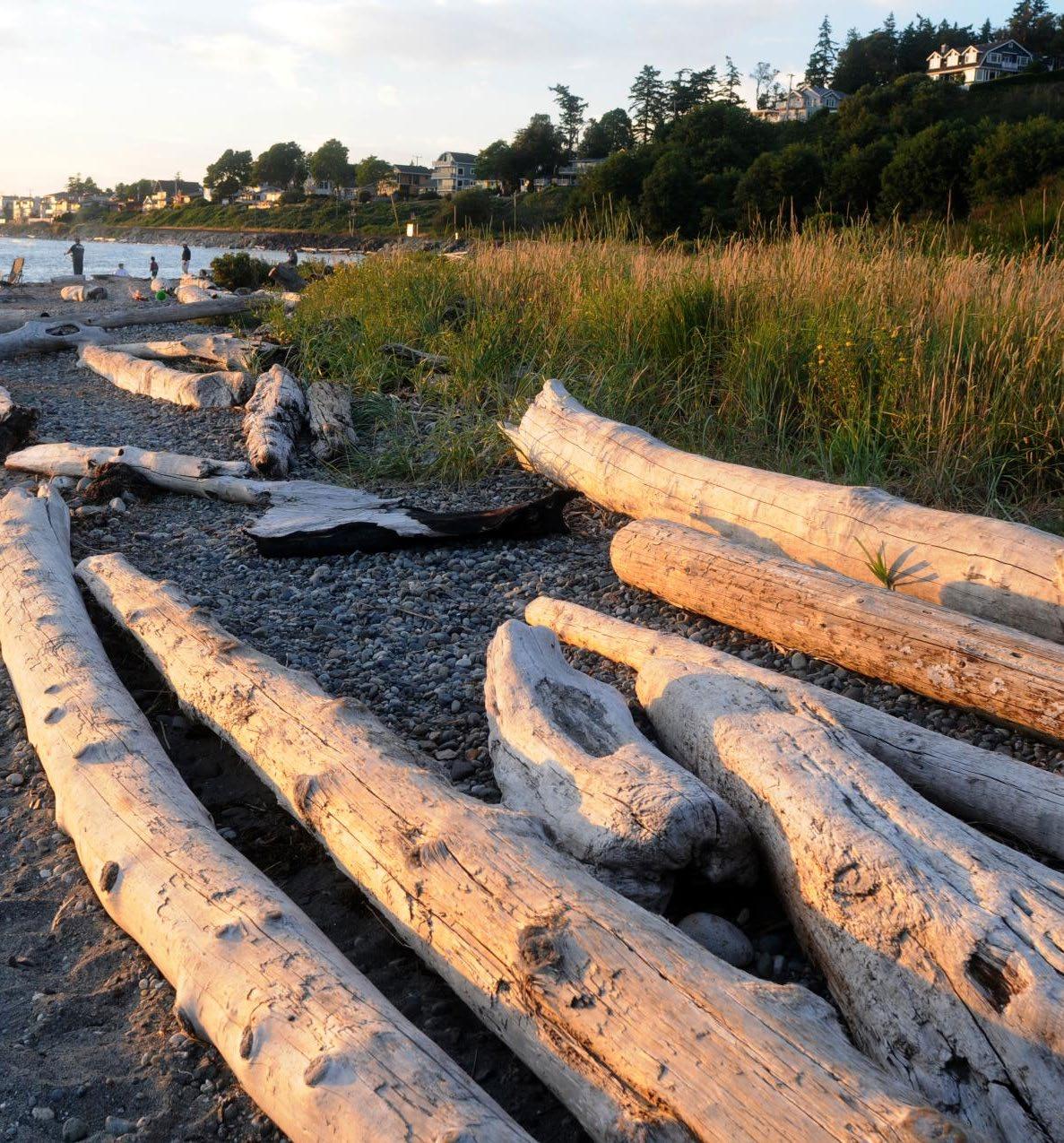
Our Climate Action Plan has 90 actions spread across five focus areas. As of 2024, 10 actions are "Complete" and 57 actions are either "In Progress" or are "Ongoing."
ዷ View a complete list of 2024 progress updates and notes for all 90 actions.
The action has a clear end point and we have reached it!
Either the action involves multiple projects or programs that we have started and are likely to continue for the entire period of the Climate Action Plan, or it has a clear end point and we are currently working on it.





We have not started working on the action.
(26 actions)
b
Zero Waste (16 actions)
(18 actions) Co M munity resilien C e (15 actions)
M s (15 actions)

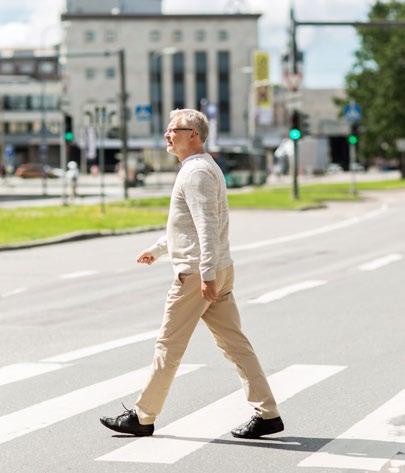
Reduce miles driven per person 20% by 2030 and 50% by 2050
We saw a 16% decrease in miles driven per person per day in 2023 compared to our 2019 baseline.†
Replace all light and medium-duty vehicles and off-road equipment in the City fleet with electric alternatives by 2030‡
70% gas or diesel
We are working to electrify the rest of our fleet. ዷ
Achieve 30% electric passenger and lightduty vehicles and 1% electric heavy-duty vehicles on the road by 2030
We estimate that 7% of registered passenger and lightduty vehicles were electric in 2024. This is up from 2% in 2020. 0% of heavy-duty vehicles were electric in 2020-2024.

30% electric or Hybrid
This is a 7% increase from 2023!


Increase public electric vehicle charging locations added annually, especially in lower income and vulnerable neighborhoods
We identified 8 public electric vehicle charging sites with 25 charging ports. This is up from 7 sites and 13 ports in 2023.


Action TM 1.10: Expand transit service and access
After decades of planning and construction, the Shoreline South/148th and Shoreline North/185th light rail stations opened on August 30. The stations are part of the Lynnwood Link Extension of Sound Transit's 1 Line.
Each station includes features that help people bike, walk, drive, and take public transit to and from the light rail. Both stations have free bike racks and lockers, a large parking garage with about 500 spaces, a passenger pickup area, and a dropoff area. The Shoreline South/148th station connects to several King County Metro routes. The Shoreline North/185th station is close to King County Metro routes that go to places like Richmond Beach and Northgate in Seattle. The station is just a 16-minute walk from the Shoreline Library.
Most of Shoreline's emissions come from gasolinepowered cars. By investing in infrastructure for walking, biking, and public transit, we are taking important steps to reduce these emissions.
Action TM 1.9: Provide shared-use electric bicycle or scooter programs
We started a two-year pilot program with Lime for a scooter and bike share service.
The program began in August with 200 devices, including 150 scooters and 50 bikes. By the end of 2024, community members recorded over 20,000 trips, resulting in an estimated reduction of 4,300-7,700 vehicle miles driven.
ዷ Learn more about the pilot and how to book an electric bike or scooter ride.
Actions TM 2.2: Community education about electric vehicles & TM 2.7: Encourage charger installation in existing buildings
We engaged with property managers and apartment residents around electric vehicles (EVs) and EV charging. The goal of this outreach was to understand 1) the needs and challenges apartment managers face with EV charging at multifamily and affordable housing and 2) the perceptions, needs, and challenges renters have about owning and charging EVs and participating in carshare services.
We will use these findings to provide targeted education and outreach. This will help apartment staff and residents move away from gas cars and transition to EVs and carshare options.

• Provide incentives for electric bikes
Action TM 1.13: Provide rebates for electric bicycles
• Eliminate parking minimums citywide to encourage ways of getting around other than driving
Action TM 1.4: Reduce demand for parking
• Present recommendations for City Council to update the municipal code and support more bicycle parking
Action TM 1.11: Increase bicycle parking infrastructure
• Reduce how many miles you drive and take transit, walk, bike, telecommute, or use shared mobility services when possible.
• Replace gas- or diesel-powered vehicles with electric options.
• Use an electric bike or scooter for short trips.

Reduce heating oil usage 100% by 2030
Compared to 2019, the *number of homes using heating oil decreased by 29%
Reduce natural gas usage 60% by 2030 and 98% by 2050
While the number of natural gas customers has increased since 2019, natural gas usage has decreased by 23% from 2019 to 2024.
ዷ Learn more about switching from gas to all-electric appliances.
ዷ More details on our target data.
Utilize electricity for space and water heating and cooling in all City facilities by 2030
4 out of 8 facilities are all-electric.
Reduce energy consumption 15% by 2030 and 30% by 2050
Compared to 2019, we saw total energy usage decrease by 13%, meaning we have almost reached our goal!
This is despite the number of buildings increasing by more than 2,000 during this time.

natural gas The other 4 use natural gas for one or more heating needs.
Increase local solar generation by 2.5MW by 2030 and 6.5MW by 2050
As of 2024, we have increased solar generation from 2019 levels by 3.6Mw


Increase the proportion of new residential buildings pursuing green certification
29% of permitted new residential buildings pursued a green building standard in 2024.
Most permits were for buildings outside of our mandatory Built Green areas, which is likely why this marks the first decrease in residential green certifications since 2020.

Launched a home electrification program
Action BE 1.3: Provide a home electrification program
In the summer, we launched Energize Shoreline – a pilot program that provides free educational workshops about heat pump technology and exclusive savings on heat pumps for Shoreline residents. Heat pumps are highly efficient, all-electric appliances that heat and cool your home. They also have other great functions, like filtering and dehumidifying indoor air. They are a key element in the transition to a safe climate and healthy environment.
The program consisted of three key components:
1. Educational workshops: We hosted three workshops to educate residents about the benefits of heat pump technology and the available rebates and incentives to help cover installation costs. 258 residents attended these workshops.
2. Installer and incentive resources: We connected residents with experienced local heat pump installers, making it easier to obtain quotes from qualified professionals. We also provided residents with information on how to stack incentives to reduce upfront installation costs. We provided an exclusive Energize Shoreline discount to 13 households who converted from a gas furnace to an electric heat pump.
3. Subsidized installations: We covered the cost of heat pump equipment and installation for four households who met certain income limits. All of these households converted from gas to electricity for heating and gained cooling for the first time.
ዷ Visit ShorelineWA.gov/GoElectric for updates on the Energize Shoreline program and to learn more about electric heat pumps.

• Continue the Energize Shoreline program and provide exclusive savings for Shoreline residents to transition to electric heat pumps
Action BE 1.3: Provide a home electrification program
• Audit select City facilities to identify potential energy savings opportunities
Action BE 1.9: Electrify City facilities
• Begin to develop a green building policy for City facilities and capital improvements that includes minimum energy efficiency standards
Action BE 4.2: Green building policy for City buildings
• Review and update the City's Deep Green Incentive Program to encourage developers to build more sustainably
Action BE 4.3: Expand incentives for sustainable building practices
• Complete a home energy audit to identify wasted energy and safety issues, unlock rebates, and suggest solutions to help you prioritize your home improvement projects.
• Choose efficient electric options when replacing fossil-fuel powered appliances for space heating and cooling, water heating, and cooking.
• Use federal or utility incentives to help you go all-electric in your home. If renting, talk to your landlord or property manager about available incentives.

Facilitate access to composting and recycling services for all residents and businesses by 2030
99.7% of single-family homes, 98.9% of apartment properties, and 91.5% businesses have recycling service as of 2024.
The number of apartment properties with compost service has increased by 19.3% since 2019.
We've also seen a 7.8% increase in businesses with compost service compared to our 2019 baseline.
ዷ Learn more about our programs to help apartment properties and businesses recycle better and compost more.

ዷ More details on our target data.
We saw waste generation decrease from 3.49 lbs. per person per day in 2019, to 3.28 lbs. in 2024. This means each resident has reduced their waste by
0.31 lbs. Per day goal Met!

We want a diversion rate of 70% by 2030. Our diversion rate is the percentage of waste that we prevent from reaching landfills through reduction, reuse, and recycling and composting programs. The higher a diversion rate, the better.
Shoreline had a 45.9% diversion rate in 2024. This is down from 50.3% in 2020.

70% diversion
This is where we want to be by 2030.


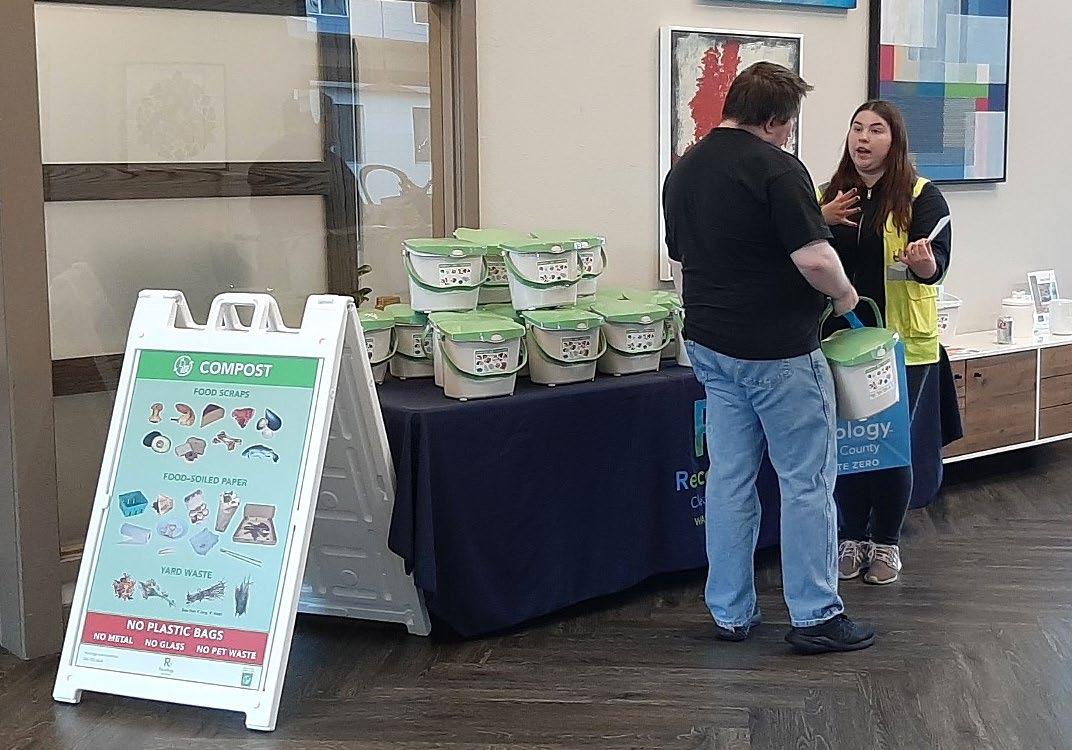
Actions ZW 1.1: Provide community programs to reduce waste & ZW 1.2: Participate in regional zero waste efforts
We used funding from King County's Re+ City grant program to pilot a Shoreline Tool Library in partnership with Lake Forest Park and the nonprofit Seattle REconomy. A tool library is like a book library but for tools and other useful items. The Shoreline Tool Library also offers discounted used building supplies, a bike repair area, and hosts regular educational events on various reuse and repair topics.
The Shoreline Tool Library helps our community send less to the landfill by sharing, reusing, and repairing tools and materials. In 2024, Seattle REconomy prevented 16,377 lbs. of salvaged building materials from going to the landfill, made 6,439 tool loans, and hosted workshops for more than 300 community members.
ዷ Learn how to borrow tools and include reclaimed building materials in your next home improvement project.
Action ZW 1.7: Reduce single-use plastic food service items
Shoreline's new law that requires businesses to use compostable service ware for takeout and to-go orders and reusable plates, cups, and utensils for in-house dining went into effect on June 1. Requiring businesses to switch to compostable and reusable food service ware reduces disposable plastic packaging that is difficult to recycle, often ends up as litter, and pollutes streams, lakes, and Puget Sound.
To help businesses comply, we provided multilingual door-todoor outreach, educational resources, and ongoing support. We paired our education efforts with an incentive program. Eligible businesses could get up to $500 to switch from singleuse plastic items to compostable or reusable products. We provided nearly $15,000 of products to 31 businesses.
ዷ See how local restaurant, Le's Pho Tai, switched from single-use plastic to compostable takeout containers.
• Reduce the amount of food you waste.
• Avoid single-use plastic items and switch to reusable options.
• Extend the life of furniture, clothing, and appliances by repairing them.

Increase carbon captured and stored by our urban forests by 5% by 2050
We estimate that we are capturing and storing 2,237 tons of carbon annually. This is our baseline. We assess tree canopy and its benefits every 5 years. We will report on our progress in 2028.
ዷ View our 2023 Urban Tree Canopy Assessment.
Increase citywide compost and mulch application by 20% by 2030
Compared to 2021, we increased our compost and mulch application by 352% in 2024.*


Increase urban forest tree canopy cover by 3% by 2050
Our tree canopy cover was 37.1% as of 2021.
We assess tree canopy and its benefits every 5 years. We will report on our progress in 2028.



As of 2024, we are actively restoring 33.5 acres of parks and open spaces, which is 14% of our 240-acre goal.


provided education through natural yard care workshops, and our Soak It Up, Communi-trees, and Environmental MiniGrant programs.

Action ES 1.9: Develop a community tree planting program
We partnered with community members to increase the number of trees in Shoreline. Our program, Communitrees, provides free trees to residents, schools, churches, and businesses. We provided over 240 trees to nearly 170 individuals. We prioritized giving trees to residents in neighborhoods with the greatest need. These included neighborhoods with fewer trees, hotter temperatures, or areas that experienced significant tree loss due to recent City or transportation construction. Nearly 70% of the trees we gave away were planted in these priority neighborhoods.
ዷ See where our community has planted trees through Communi-trees and the 2024 Tree-port that highlights more program successes.
• Protect existing trees and natural areas on your property. If you have room, consider planting more trees.
• Remove invasive species, lawns, and hardscaped areas on your property and add native plants. Amend landscape beds with compost or natural mulch wherever possible.
• Volunteer with the Green Shoreline Partnership to restore urban forest habitat in our parks.
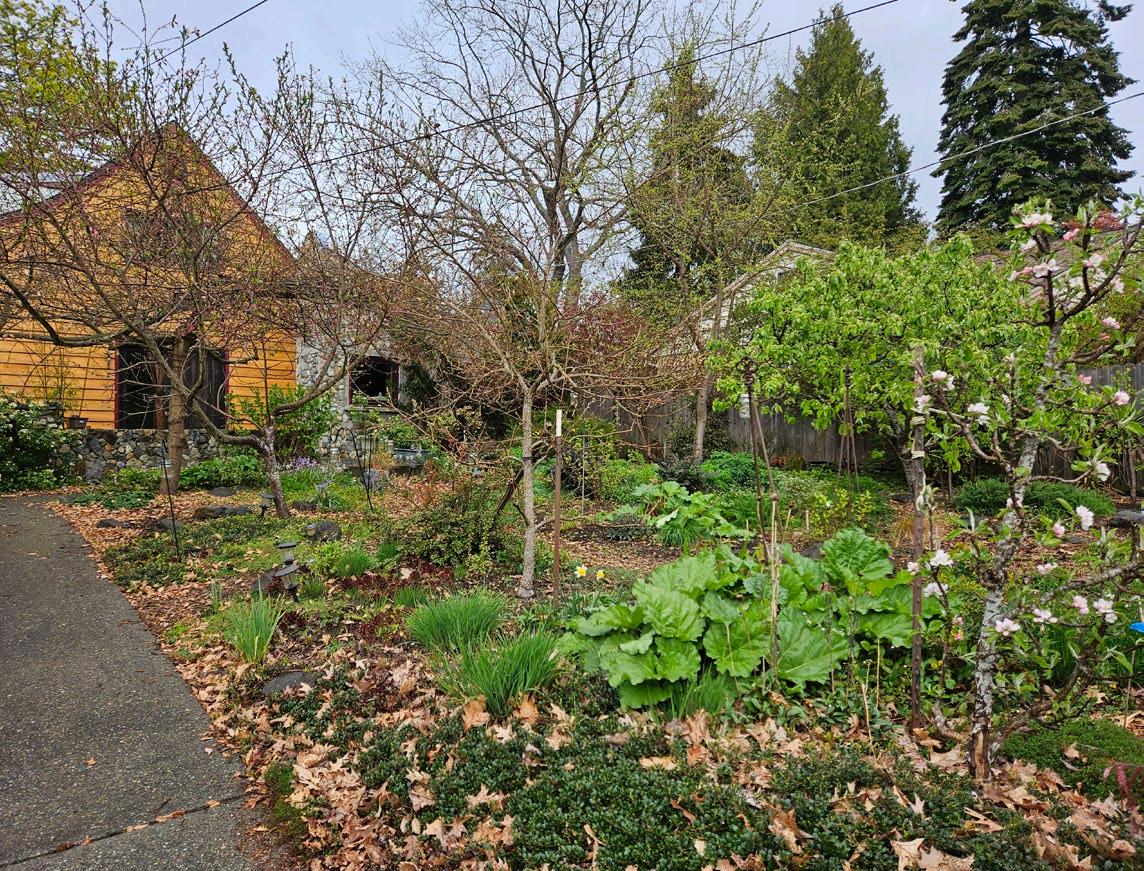
Action ES 1.12: Fund habitat projects on private property
We helped home and business owners install rain gardens and native vegetation landscaping on their property through our Soak It Up rebate program These features are part of a natural approach to managing rainwater. They help recreate a forestlike environment in our city by allowing rainwater to soak into the soil and naturally return to groundwater resources and waterways. These gardens also support native birds and pollinators and can help resolve pesky drainage issues. We provided nine rebates totaling $16,320.
Action ES 1.2: Fund habitat projects on private property
We also worked with the community to design plans for new green spaces at Sunset School Park, such as trees, gardens, and nature-based play areas. Green spaces could bring natural beauty to the park and replace some of the park’s lawn or asphalt areas. Adding green spaces to Sunset School Park supports many environmental goals. These include protecting waterways and Puget Sound, fighting climate change, and supporting pollinators.
We gathered feedback from over 180 community members on the types of green spaces they'd like to see at Sunset Park. We will use this input to create the first draft designs for the park and share them with the public in early 2025.

Increase the reach of projects that support climate education and awareness annually
We estimate reaching 201 people through our Soak It Up and Environmental Mini-Grant projects in 2021. In 2024, we reached at least 462 people. This represents a 130% increase.

Update the Hazard Mitigation Plan every 5 years to continue to build upon climate adaptation and resilience strategies and best practices
We last updated our Hazard Mitigation Plan in 2020. We will update the plan again in 2025.
Reduce the area of the city experiencing urban heat island impacts 25% by 2030 and 50% by 2050
Compared to our 2022 baseline, we saw a 7.3% decrease in areas experiencing some form of urban heat island impacts in 2023.*
ዷ More details on our target data.
Reduce the average number of buildings flooded by stormwater from public roads from 2023 baseline data
Our 5-year average increased to 13 in 2024. This is up from 12.8 in 2023. Over time, the average is expected to decrease as flood reduction efforts continue.
Invest $150,000 for climate awareness and communitybased mitigation projects by 2030

goal Met!
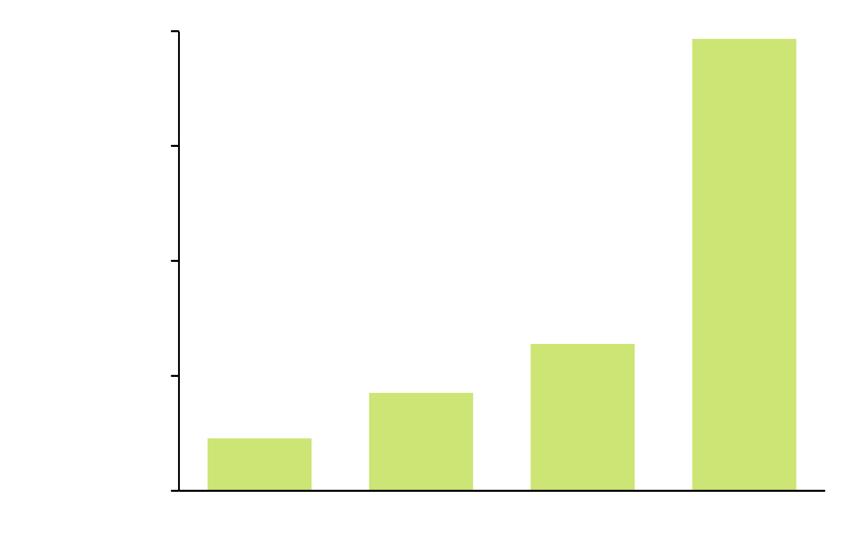
$150k
$100k
$50k
$200k Cumulative dollars invested/awarded
At least 95% of Shoreline community residents polled respond that they care about climate change and understand how they can take action
In the 2024 Resident Satisfaction Survey, 75% responded that they are concerned to extremely concerned about climate change. 91% said they are at least somewhat familiar with how to take action.
$196,606 awarded since 2021. As of 2024, we have reached our goal!
Increase the availability of emergency preparedness materials and trainings to the public by 50% by 2030
We trained 15 Community Emergency Response Team (CERT) volunteers, held three CERT meetings, and shared materials at two outreach events. This is a 21% increase compared to 2023.

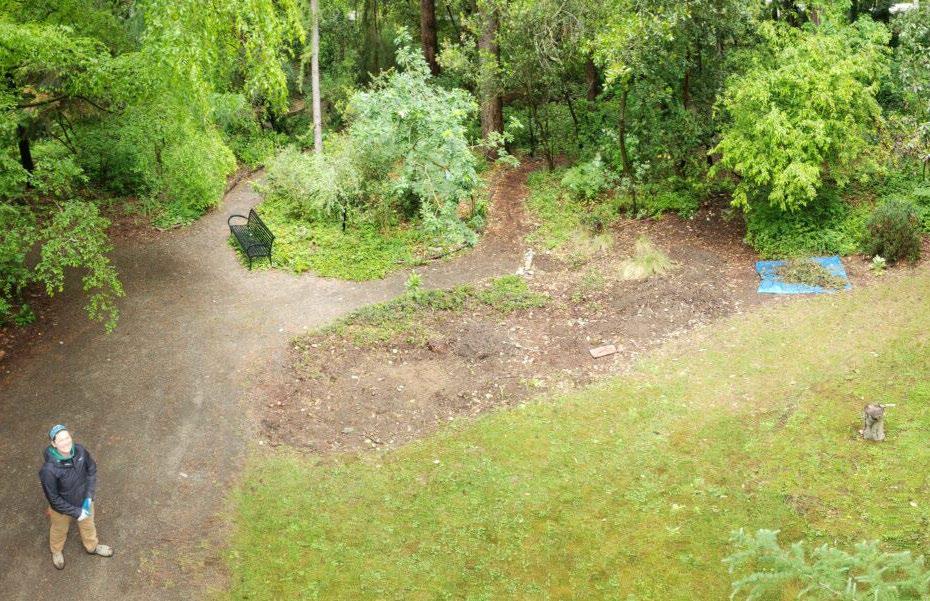

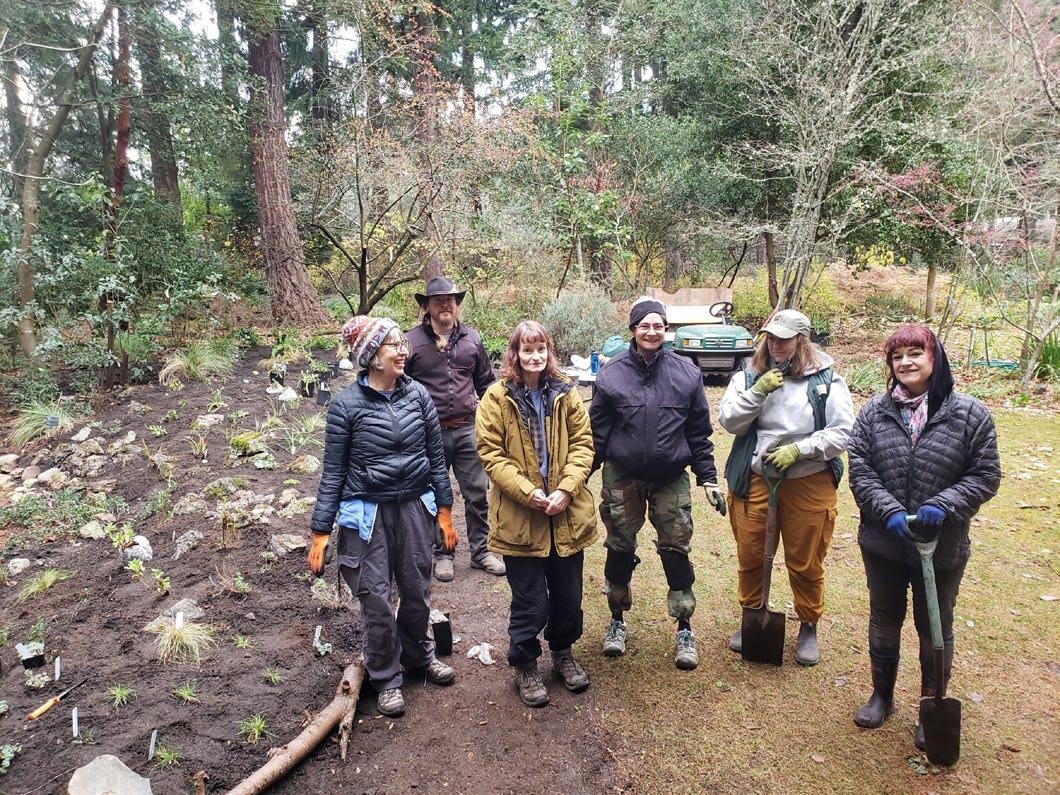
Action CRP 2.3: Provide community cooling centers
In partnership with the King County Regional Homelessness Authority and the Cities of Bothell, Kenmore, Lake Forest Park, Shoreline, and Woodinville, we opened a cooling center in July during an extreme heat event. This center, known as the North King County Severe Weather Shelter, will continue to provide these services for extreme weather events.
Actions CRP 3.1: Provide mini-grants for community climate projects & CRP 1.5: Community "nature-scaping" education
Through our Environmental Mini-Grant program, we provided Kruckeberg Botanic Garden Foundation funding to install a climate resilience garden. Designed to showcase drought-tolerant plants, this garden highlights the value of planting species that can thrive in our region's increasingly dry and warm conditions.
The garden features over 700 plants, including native and adaptive exotic species carefully selected for their resilience. A series of interpretive signage provides insights into climate-resilient gardening and educates visitors on applying these principles at their own homes.
ዷ Visit Kruckeberg.org/Climate to learn more about the climate resilience garden and find resources and plant lists.
We also increased the funding available for Environmental Mini-Grant projects starting in 2025.
• Improve the Climate Impacts Tool and reinforce its use
Action CRP 1.1: Expand Climate Impacts Tool usage
• Develop a list of recommended design practices and update codes and standards to increase climate resilience for private development and City capital projects
Actions CRP 1.2: Develop recommended design practices for urban heat & CRP 1.3: Climate resilient urban design standards
• Increase incentives within the Soak It Up rebate program to make the program accessible to a broader portion of the Shoreline community
Action CRP 1.4: Increase incentives for resilience retrofits

